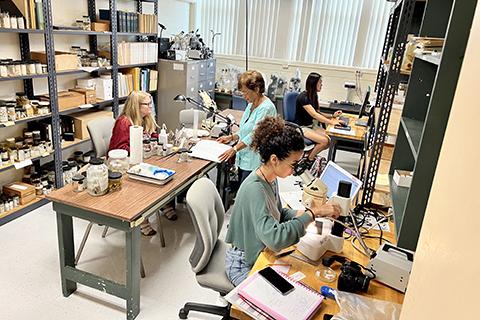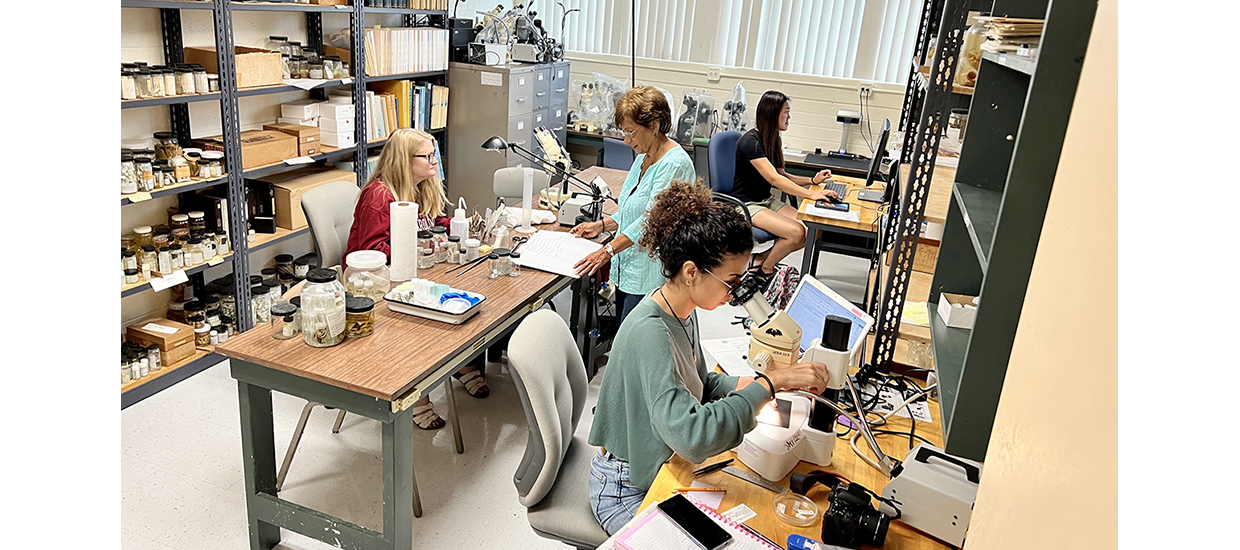The Marine Invertebrates Collection, now known as the Gilbert and Nancy Voss Marine Invertebrate Collection (VMIC), was founded in 1943 by renowned oceanographer F. G. Walton Smith. With few rivals in terms of collection size, the geographic and vertical ranges of Atlantic tropical species collected by the VMIC are of exceptional value as research, teaching, reference and data resources due to their comprehensive nature. Furthermore, a major portion of the material has been and continues to be identified by leading specialists from around the world.
The collections consist of ca 82,753 lots (a lot is defined as a single container, containing one to several hundred individual specimens of a species) belonging to 17 phyla. Presently, 41,902 of these samples are cataloged and identified to species, with most of the remaining lots identified to order or family. The collections include 628 type samples.
The museum’s holdings include the macro-invertebrates taken during the 1963–71 National Geographic Society (NGS)/NSF funded Deep-sea Biology Program, and the subsequent 1972–76 NSF-funded expeditions. During these expeditions, pelagic and benthic communities from the abyssal to the epipelagic and inner shelf zones were sampled at 1,309 stations spanning from the Gulf of Panama, throughout the Caribbean, and to the Gulf of Guinea. An additional 2,062 stations were sampled across the entirety of the Florida Straits and the Bahamas, including its eastern deep-water basins and the area northward to the Bermudas.
The VMIC also contains Florida reef samples collected during the 1961–63 NGS-supported reef ecology study and the 1980–81 NOAA baseline surveys of the flora & fauna of the Pennekamp Coral Reef State Park and the National Marine Sanctuary. Among the various other holdings in the VMIC are those from the St. John, Virgin Island survey, the 1966–67 Panama Interoceanic Sealevel Canal biological survey, the 1961 Argosy Expedition to the eastern tropical Pacific (Gulf of Panama to Gulf of Guayaquil), the oil pollution surveys of Cabo Rojo, Puerto Rico and other areas in the Caribbean, two early sponge surveys (1947, 1948) of the eastern Gulf of Mexico and the Florida Keys, and the large FL/Carib/ETPac marine mollusk collections of the early naturalist C.T. Simpson and the geologist/paleobiologist A. Olsson. The large collections from the extensive Gulf of Mexico and Caribbean surveys by the US Fish and Wildlife Service vessels are also well represented in our holdings, in addition to the tropical collections of a number of other research vessels.
Recent notable acquisitions to the VMIC also include the coral collections from Peter Glynn’s (RSMAS) 1970s reef studies in the eastern tropical Pacific/Samoa/Guam/Oman, corals from his 1999-2005 Easter Island studies, and the corals and other invertebrates from his continuing reef studies in the eastern tropical Pacific.
The collection also includes Donald Moore’s (RSMAS) extensive micro-mollusk slide collection from Florida, South and Central America, the Caribbean and Bahamas; a representative collection of the amphipods of Venezuela from a recent marine biodiversity project; the invertebrates (except for mollusks) taken during the 2001–2004 cruises of the R/V Bellows and R/V Suncoaster (Anton Oleinik, Florida Atlantic University) in the Straits of Florida east of the Bahamas and off of the Florida Keys; the invertebrates from several recent (2003–2006, RSMAS and UM Biology Dept.) studies in the Bahamas; and the large caridean shrimp collection from the western Atlantic, Gulf of Mexico, Caribbean and the eastern tropical Pacific from the 2009–2010 molecular systematic studies of Antonio Baeza (formerly STRI).
As a repository for one of the most comprehensive and diverse collections of tropical Atlantic and eastern tropical Pacific marine invertebrates, as well as the recent use of molecular techniques for phylogenetics, biodiversity, biocomplexity, conservation, responsible management, and sustainable use of marine resources and the search for natural marine products, the Voss Marine Invertebrate Collection presently plays, and will increasingly play, an irreplaceable role in ongoing and future research and teaching in these fields at RSMAS, the University of Miami, and other U.S. & international institutions. The museum currently collaborates with marine biodiversity projects in Colombia, Costa Rica, the Dominican Republic, Mexico, Venezuela, and many others worldwide.





